Rare earths and lithium
• The term ‘rare earths’ refers to 17 chemically similar elements (15 lanthanides, plus scandium and yttrium)
• The element Lithium is often used alongside other ‘rare earths’ and is of equal importance for the batteries for electric vehicles (EVs). It has been called ‘white oil’.
• The term ‘rare earth’ is something of a misnomer - they were named as such when they were first discovered in the late 1700s, but we now know that they proliferate in many locations around the world.
Figure 1. Lithium production (1995-2021)
The following sections look at new developments in the USA, Portugal and France.
USA
A deposit of lithium has been discovered in the McDermitt caldera of an ancient super volcano at Thacker Pass in Nevada. Lithium is a valuable source to produce lithium-ion batteries which are increasingly important for energy storage from intermittent energy sources such as solar and wind. Currently, investment by Chinese firms has given China controlling power over a parge proportion of the world’s lithium sources. A find of this magnitude has the potential to increase US energy independence and provide more competition in the international market.
Figure 2. Sources of lithium production
Source: CleanTechnica
Portugal
• Portugal has 10% of Europe’s lithium deposits – amounting to over 60,000 tonnes.
• In February 2022, the Environment Ministry gave the go-ahead to the mining of lithium at six sites across the country.
• However, at some of the sites, including Barroso and Pinhel in the north of the country, local people have mounted campaigns to stop the mines.
• Barroso, which is also an environmentally protected area, has deposits worth £1.5 billion over the next 15 years, according to the mining company Savannah Resources.
• The company says that 800 jobs will be created. It says money will be invested back into the community – houses, social facilities and energy supplies.
• However, the local mayor states that 95% of the population of the area are against the mine.
• They fear environmental damage such as loss of irrigation water and contaminated land.
France
• In October 2022, the French mining company, Imerys, revealed plans to develop a new lithium mine in central France (near Beauvoir).
• The aim is to produce 34,000 tonnes of lithium hydroxide per year – enough for 700,000 EV batteries for 25 years – from 2028.
• The mine would also improve the EU’s industrial sovereignty at a time when car and battery manufacturers are heavily dependent on imported lithium - a key element in the Green Transition.
• The EU plans to stop the sale of new diesel and petrol vehicles in 2035, causing the high demand for lithium batteries.
A short video regarding lithium mining in Portugal can be viewed at:
Portugal's government approves lithium mining despite growing concerns | Euronews
A short video regarding lithium mining in France can be viewed at:
France to develop major lithium mine as Europe moves to electric vehicles • FRANCE 24 English





Very interesting - especially in the context of Global Governance. Worth mentioning that despite vast mineral wealth in Africa there is relatively little mining activity. Why is that? Many reasons of course but it is probably the global core concerned about the risk of investment - often 4 or 5 years of mining before seeing any return. Then factor in political instability.
An old adage:
Q. What is the definition of a mine?
A. A hole in the ground with a liar standing next to it.